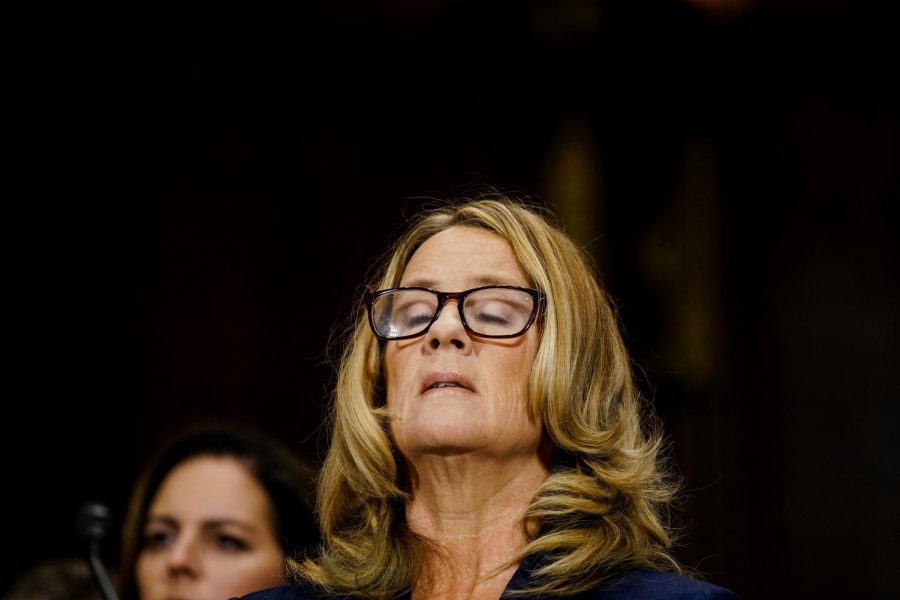Helton: You know rape survivors
Social awareness about sexual violence has come a long way, but there’s still work to be done.
Christine Blasey Ford takes a breath at a Senate Judiciary Committee hearing on Thursday, Sept. 27, 2018 on Capitol Hill in Washington, D.C. (Melina Mara/Pool/Abaca Press/TNS)
October 3, 2018
You know rape survivors. You’ve read the news. You’ve seen the reports. You’ve watched those videos during Orientation. Sexual misconduct, harassment, and assault are prevalent, pervasive, and that’s probably not going to change any time soon.
You know rape survivors. “Every 98 seconds, an American is sexually assaulted,” announces the website for the Rape, Abuse, and Incest National Network, rainn.org. One in 6 American women will be the target of rape, most of which will be completed. The same is true for about 1 in 33 American men. In your 300-student gen ed class, at least 20 Hawkeyes in that lecture hall are or will be a victim of rape, according to the stats.
RELATED: UI sexual-misconduct coordinator speaks on priorities for the school year
You know rape survivors. It’s not just Christine Blasey Ford or Women’s Marchers, but everyday people in your everyday life. So why does it matter?
As someone who is not a survivor, it feels like I’m an outsider looking in, like I can’t understand the pain of those who have suffered life-altering trauma. It doesn’t feel like my problem. That’s not how we usually treat other kinds of survivors, though. Hurricanes, epidemics, and terror attacks all feel more immediate, as if they’re more important than the lives of the people whose lives have been hurt by sexual assault. We have to change our collective consciousness about how we treat them.
RELATED: Non-profit calls for cultural shift to prevent sexual assault, gender-based violence
There are plenty of resources for safety, prevention, and recovery (including rainn.org) of which all of us can become more aware, but there’s more to be done on a policy and personal level.
Let’s start with policy. What can those in charge do?
For starters, they can do better at believing survivors of sexual violence and more, actually caring. There’s been plenty said about the treatment of Ford by the Senate Judiciary Committee on Sept. 27. She was considered a credible witness by many members of the committee, believable and brave. But that wasn’t enough to change the minds of Republicans — with the possible exception of Sen. Jeff Flake, R-Ariz. — to actually take any sort of action. If we are really going to start believing survivors, it’s going to take more than some kind words while we move on to the next thing.
It’s not entirely bad news. Thankfully, not all institutions are as gummed up as the U.S. Senate. The UI has taken several steps toward preventing sexual assault on-campus and creating better response systems when assaults are reported. The Women’s Resource & Action Center is a highly active agency that advocates for survivors and has teams open to all genders.
But let’s move on to personal progress. What can you do?
Registering to vote out lawmakers who dismiss survivors is essential. Groups such as the aforementioned WRAC are easily accessible on campus. The Women’s March on Jan. 19 in cities around the world. However, the most important thing you can do is be informed and be aware.
We know rape survivors. It’s a fact, but it shouldn’t discourage us; it should inspire us to build a safer world where everyone is heard and protected.






